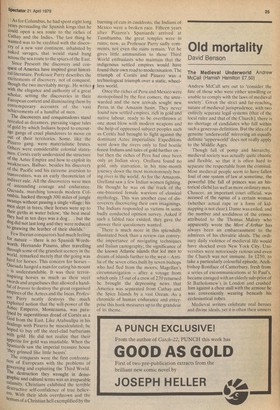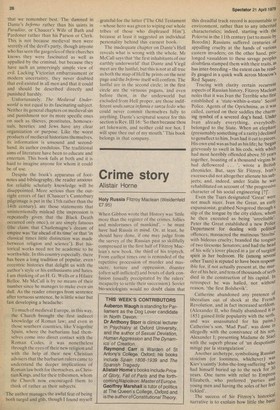Old mortality
David Benson
The Medieval Underworld Andrew McCall (I-tarnish Hamilton £7.50) Andrew McCall sets out to 'consider the fate of those who were either unwilling or unable to comply with the laws of medieval society'. Given the strict and far-reachint, nature of medieval jurisprudence, with two entirely separate legal systems (that of the local ruler and that of the Church), there is no shortage of candidates who fall within such a generous definition. But the idea of a genuine 'underworld' mirroring an equally definite `upperworld' does not really apply to the Middle Ages.
Though full of pomp and hierarchy, medieval society was actually quite chaotic and flexible, so that it is often hard to separate the respectable from the criminal. Most medieval people seem to have fallen foul of one system of law at sometime, the powerful (the fall of princes was an historical cliche)as well as more ordinary men. Chaucer, an important court official. was accused of the raptus of a certain woman (whether actual .rape or a form of kidnapping is not clear). Dante was exiled, and the number and sordidness of the crimes attributed to the Thomas Malory who ' apparently wrote the Mort d'Arthur has always been an embarrassment to the admirers of his chivalric ideals. The ordinary daily violence of medieval life would have shocked even New York City. Universities were notoriously riotous and even the Church was not immune. In 1250, to take a particularly colourful episode, Archbishop Boniface of Canterbury, fresh from a series of excommunications at St Paul's, became enraged with an elderly sub-prior of St Batholomew's in London and crushed him against a choir stall with the armour he was conveniently wearing beneath his ecclesiastical robes.
Medieval writers celebrate real heroes and divine ideals, yet it is often their sinners that we remember best. The damned in Dante's Inferno rather than his saints in Paradiso. or Chaucer's Wife of Bath and Pardoner rather than his Parson or Clerk. This is not because medieval men were secretly of the devil's party, though anyone who has seen the gargoyles of their churches knows they were fascinated as well as appalled by the criminal, but because they have such an unnervingly simple view of evil. Lacking Victorian embarrassment or modern uncertainty, they never doubted that evil existed in all men and that it could and should be described directly and punished harshly.
Unfortunately. The Medieval Underworld is not equal to its fascinating subject. Neither its general chapters on medieval sin and punishment nor its more specific ones on such as thieves, prostitutes, homosexuals, heretics and Jews have any clear organization or purpose. Like the worst products of medieval historians themselves, its information is unsound and secondhand. its author credulous. The traditional aims of literature have been to educate and entertain. This book fails at both and it is hard to imagine anyone for whom it could be of use.
Despite the book's apparatus of footnotes and bibliography, the reader anxious for reliable scholarly knowledge will be disappointed. More serious than the outright errors of fact (Chaucer's Canterbury pilgrimage is put in the 15th rather than the 14th century). are those statements that unintentionally mislead (the impression is repeatedly given that the Black Death occurred only once), or are simply fatuous (the claim that Charlemagne's dream of empire was 'far ahead of its time' or that 'in classical times little distinction was made between religion and science'). But historical works need not be academic to be worthwhile. In this country especially, there has been a long tradition of popular, even eccentric histories that delight us with the author's style or his enthusiasms and hates. I am thinking of an H. G. Wells or a Hilaire Belloc. Mr McCall is by no means of their number since he manages to make even sin dull. As the reader emerges from sentence after tortuous sentence, he is little wiser but fast developing a headache: To much of medieval Europe. in this way. the Church brought the first indirect knowledge of Roman law; and even in those southern' countries. like Visigothic Spain. where the barbarians had themselves come into direct contact with the Roman Codes, it was nonetheless through the eyes of their new religion and with the help of their new Christian advisers that the barbarian rulers came to understand the deeper implications of Roman law both for themselves. as Christian Kings. and for their tribesmen, whom the Church now encouraged them to think of rather as their subjects.
The author manages the awful feat of being both turgid and glib, though I found myself grateful for the latter (The Old Testament — whose hero was given to wiping out whole tribes of those who displeased Him'), because at least it suggested an individual personality behind this earnest book.
The inadequate chapter on Dante's Hell reveals what is wrong with the whole. Mr McCall says that 'the first inhabitants of our earthly underworld' that Dante and Virgil meet are the lustful; but this is not at all true as both the map of Hell he prints on the next page and the Inferno itself will confirm. The lustful are in the second circle; in the first circle are the virtuous pagans, and even before them, in the underworld but excluded from Hell proper, are those indifferent souls sanza infamia e sanza lodo who could never commit themselves fully to anything. Dante's scriptural source for this section is Rev. III 16: `So then because thou art lukewarm, and neither cold nor hot. I will spue thee out of my mouth.' This book belongs in that company.
THIS WEEK'S CONTRIBUTORS Auberon Waugh is standing for Parliament as the Dog Lover candidate in North Devon.
Dr Anthony Storr is clinical lecturer in Psychiatry at Oxford University, and the author of Sexual Deviation, Human Aggression and The Dynamics of Creation.
Raymond Carr is Warden of St Antony's College, Oxford; his books include Spain 1808-1939 and The Spanish Tragedy. Alistair Home's books include Price, of Glory, Fall of Paris and the forthcoming Napoleon: Master of Europe. Geoffrey Marshall is tutor of politics at The Queen's College, Oxford and is the author of Constitutional Theory.







































 Previous page
Previous page